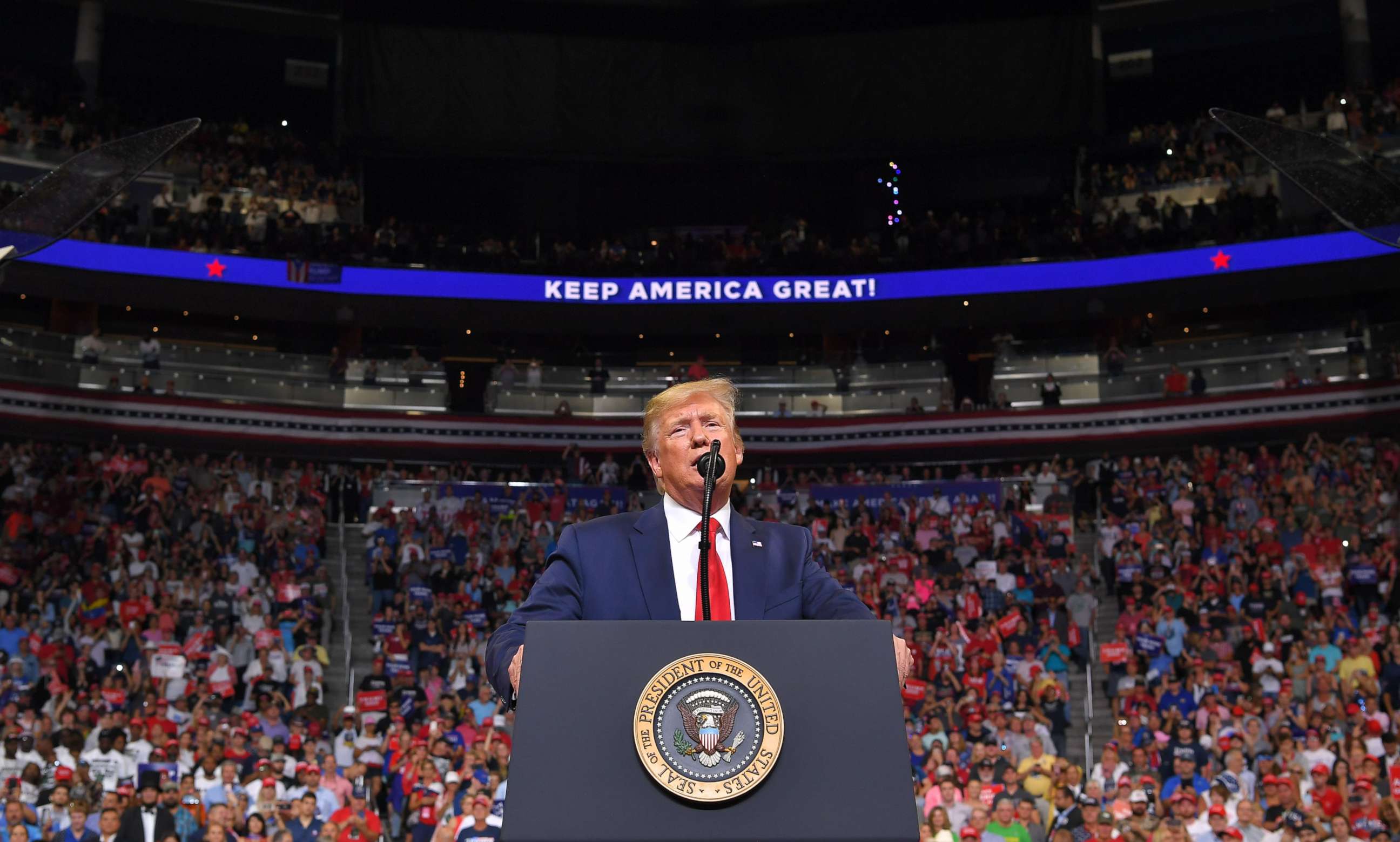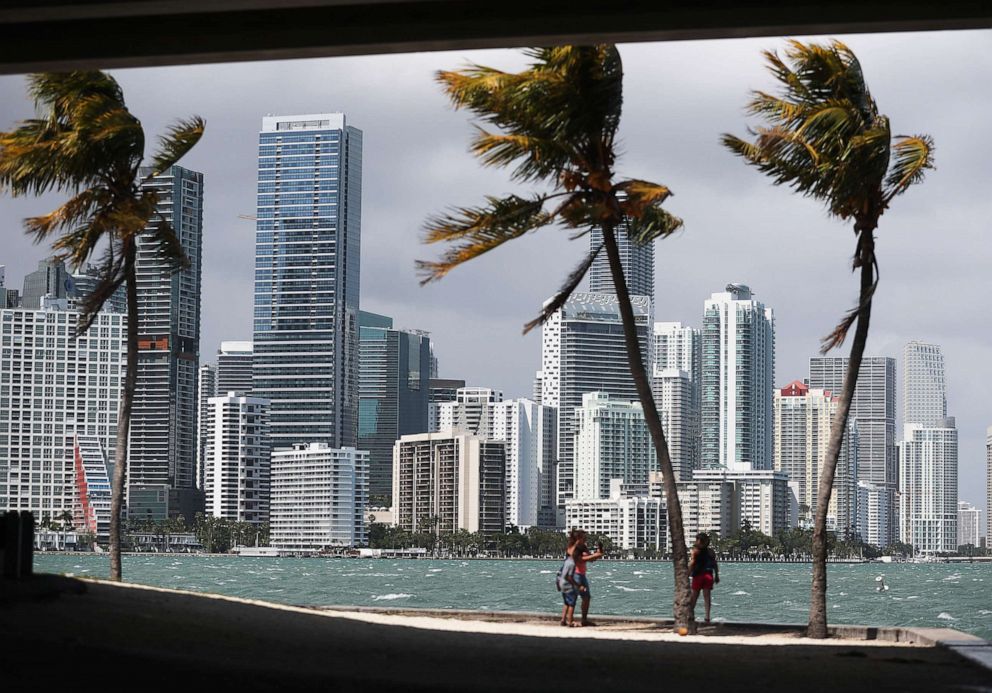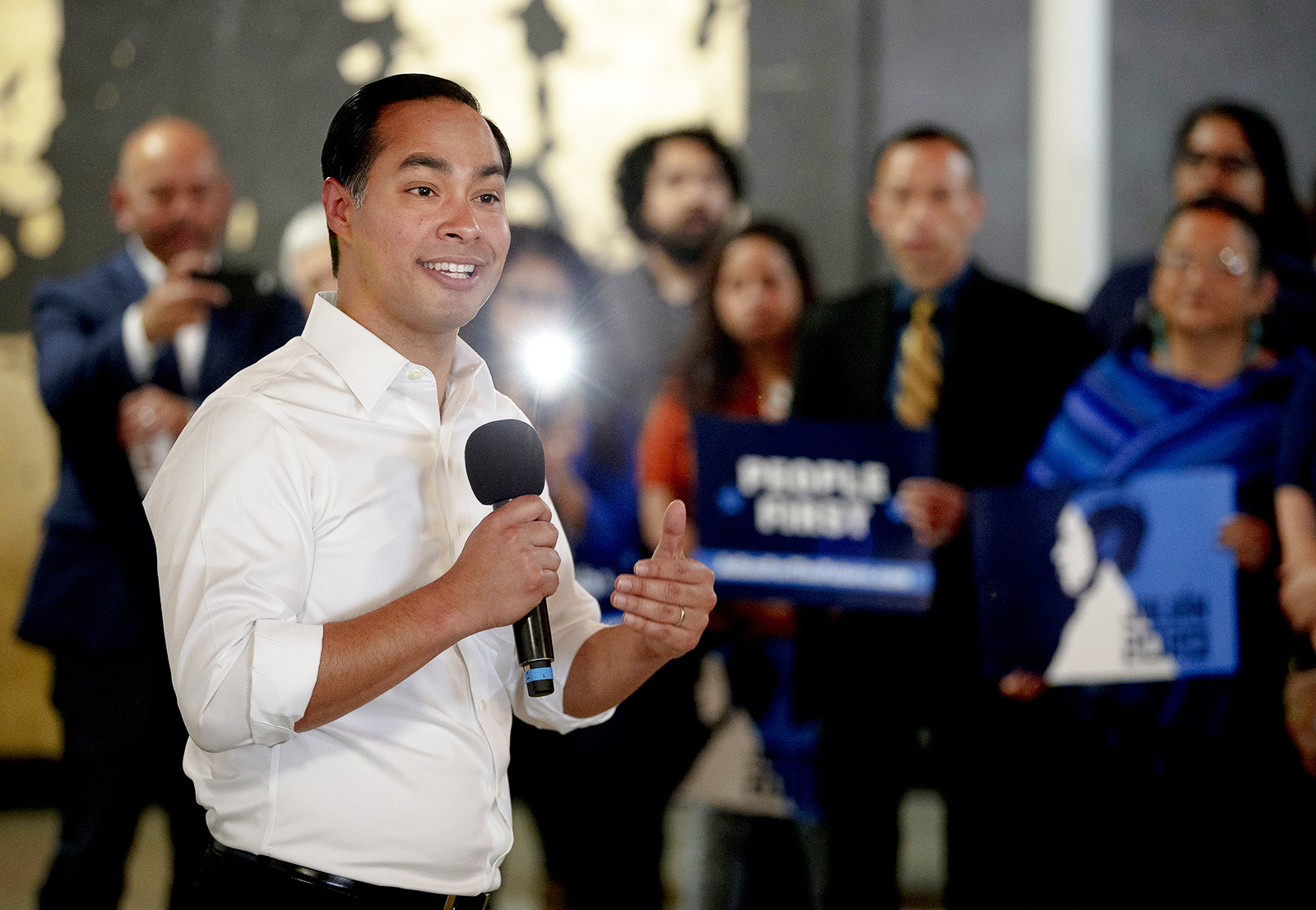Democratic presidential candidates pitch Latinos at Miami forum ahead of debates
Latinos will become the largest minority voting bloc this election cycle.
MIAMI -- Eight Democratic presidential candidates descended on Miami for a forum focused on Latino issues Friday morning, their appearance highlights the early importance of one of the most vital swing states and the need to make inroads with Hispanic voters -- a group set to become the largest minority voting bloc this election cycle.
South Bend, Indiana, Mayor Pete Buttigieg, former Secretary of Housing and Urban Development Julián Castro, former Colorado Gov. John Hickenlooper, Minnesota Sen. Amy Klobuchar, former Texas Rep. Beto O'Rourke, Vermont Sen. Bernie Sanders, California Rep. Eric Swalwell and Massachusetts Sen. Elizabeth Warren were all slated to take the stage at the Telemundo Center at the National Association of Latino Elected and Appointed Officials presidential candidate forum. The event occurred just days before 20 of the 23 major Democratic candidates meet for the first two-night debate of the 2020 presidential election season.
Democrats aren't the only ones with a giant stake in the Sunshine State.
Conference moderators pressed the candidates on their immigration reform, climate change, and healthcare policy during their allotted 12 minute speaking times.
But the key question each candidate faced was in regards to the 2020 census.
The Trump administration has fought to add a question about citizenship into the 2020 census, a short form that is distributed to each United States household designated to collect information such as age, sex, race, and origin data, as a representation of the United States population. Those opposed to the question suggest the question hurts the authentic representation of the United States and will reduce the response explicitly towards immigrant communities. Currently, the question is being upheld in the United Supreme Court.
"It is going to diminish the strength of the United States of America, and we know, from recently released documents that it is racist in its design, it's intended to suppress the vote of Latinos, people of color, those whose country of national origin was some other place, who came here to contribute to our babies. Let's make sure they can by counting every single one of them,” O’Rourke responded.
Warren deferred her position until the Supreme Court decision is released. If the Supreme Court moves forward with the question Warren said she will have a plan for it then.
She continued, “This is really important. This is not about dodging. It's about saying let the Supreme Court-- that's where it stands right now. There's been a lot of new evidence that's come in. I think it's critically important that the Supreme Court issue its decision, and then depending on exactly what it is the Supreme Court says, I think we'll have the right response.”
Just this week, President Donald Trump officially launched his 2020 reelection campaign in Orlando, Florida, holding his event in a state he frequently calls his second home. Next week the Trump campaign is expected to roll out a national "Latinos for Trump" effort in Miami aimed at turning out headlined by Vice President Mike Pence alongside Florida Lt. Gov. Jeannette Nunez, who's Cuban American.

The plan is part of the campaign's larger strategy to reach out to Hispanic voters, particularly on television, with Trump sitting down for an interview this week with Telemundo anchor José Diaz-Balart in the president's first interview with a Spanish-language network.
During the interview set to air Thursday night, Trump told Diaz-Balart that Latino voters want him to follow through on his threat to deport millions of undocumented immigrants.
"They want me to do it -- they're here illegally. They don't want to lose their jobs, they want to keep their salaries, their wages, up," Trump said. "And they don't want crime. When people come through, you have MS-13 coming through."
Former Housing and Urban Development Secretary Julián Castro, the only Latino presidential candidate running against Trump, told ABC News during the NALEO conference on Friday that despite Trump's grip on some Latino voters, he was poised to win the overall vote if he ran against him.
"You're always going to have some percentage of any community that is going to vote for the Republican, but as you can see this in some of the head to head polling that is starting to come out, if I do run against the president, you know, I'm confident that I can get a much larger share of the Latino community than any Democratic nominee has been able to get probably ever," Castro said. "And that the percentage turnout, the turnout rate of Latinos would jump significantly if I'm the nominee."
Castro responded to the news of Trump’s Latino coalition organizing next week in a press conference responding that despite the Presidents efforts he is ‘confident’ that he can get the largest share of the Latino community out of any of the Democrats nominee. He said the Latino rate would ‘jump’ and help needed blue states such as Florida, Texas, Arizona, Nevada and Colorado.
The candidates were key to point out Trump’s ‘negative’ actions towards the Latino community.
"There is nothing this president will not do to hold you back. He will break up your families. He will cage your children. And he has weaponized counting. And there is nothing we won't do to stop him." Swalwell said. Sanders suggested that the President is very serious with his rhetoric in alienating immigrants and voters should take that seriously.
“Today I make a very simple promise to you. That protecting the undocumented, the comprehensive immigration form, and reinstating the legal status to the 1.8 million in DACA – and creating a border policy will be at the top of my agenda,” Sanders said.
Why Florida?
Florida is no stranger to extremely close races and post-election day drama. Since the 2000 Bush vs. Gore hanging-chads saga, the last two presidential elections have been decided by approximately 1 percentage point -- Barack Obama won Florida in 2012 by less than 1%, and Donald Trump won the state in 2016 by 1.2%.
Most recently, two Trump-backed candidates faced some recount drama of their own following a contentious 2018 midterm election.
Following two weeks of machine and manual recounts, allegations of voter fraud and uncounted ballots, former Republican Rep. Ron DeSantis narrowly won the state's gubernatorial race, by 32,463 votes. Meanwhile, then-Gov. Rick Scott won a Senate race by just 10,033 votes. Both candidates had some of the president's biggest midterm endorsements, with the fate of the 2020 presidential election potentially hanging on the results of their own races.
By the numbers
According to 2018 midterm election exit polls, 15% of Florida voters identified themselves as Hispanic or Latino, and the group favored Democrats by about 10 points in statewide races -- Democrat Bill Nelson outpaced Republican Rick Scott 54% to 45% in the Senate race, and Democrat Andrew Gillum led Republican Ron DeSantis 54% to 44%.
The percentage of Hispanics and Latinos as a proportion of the total 2016 Florida electorate was 18%, and there was a strong preference for Hillary Clinton, who outperformed Trump within the group 62% to 35%. But Trump's relatively poor performance among the Hispanic/Latino population statewide was fairly isolated, as Republican Sen. Marco Rubio received support from 48% of the bloc, nearly matching Democratic challenger Patrick Murphy.

In 2018, 39% of Hispanic/Latino exit poll respondents said they considered themselves Democrats, compared to 35% who said they were Republicans. As a whole, the group skews middle-right of the political spectrum, with 42% considering themselves moderate "on most political matters," 32% saying they're conservative and 26% claiming to be liberal. Nearly one-third of the group said it was their first time voting in a midterm, potentially a sign of a boom in Latinos reaching voting age or more of them being interested in politics -- or both.
Despite frequent outreach to the community by candidates on the topic of immigration, Hispanic and Latino exit poll respondents in 2018 showed less interest in the issue than white voters, with 24% of Hispanics and Latinos noting that immigration was the most important issue facing the country, compared to 35% of their white counterparts.
Further, 54% of Florida's Hispanics and Latinos said Trump's immigration policies were "too tough," compared to 18% who said they weren't tough enough and 26% who felt they were "about right."
Opportunity for Castro
This is the second time Democratic presidential candidates gathered to discuss issues specific to the Latino community and the largest gathering of its kind so far.
Last month, four presidential candidates participated in the Unity & Freedom presidential forum focused on immigration in Pasadena, California. While the forum mainly focused on issues facing the undocumented immigrant community, Friday's forum in Miami allowed candidates a platform to speak on a plethora of issues affecting the Latino community.
The NALEO forum and next week's debate present a particularly unique opportunity for Castro, the field's lone Latino candidate, who, in polls, has sat in the middle of the crowded group for much of the year, despite his early entrance into the race and diverse resume.
Castro has made no secret of his identity while on the trail, speaking with regularity of his grandmother's immigration to the U.S. from Mexico and making immigration reform one of the first issues of the focus of his campaign. His brother Rep. Joaquin Castro, D-Texas, sits on NALEO's board of directors.

But, just as African American candidates Sens. Cory Booker, D-N.J., and Kamala Harris, D-Calif., have campaigned diligently in South Carolina, making no assumptions that the black voters who make up 60% of the early-voting state's Democratic registrants would automatically gravitate towards a figure with a shared identity, so, too, the former HUD secretary isn't taking for granted support from Latinos -- particularly in Florida, where the population is highly diverse, hailing from a wide variety of Spanish-speaking nations in South and Central America and across the Caribbean.
"The worst thing Julian Castro can say is, 'I have the Latino vote in the bag because of my last name and because I was mayor of San Antonio,'" Arturo Vargas, NALEO's CEO told The Intercept last year. "The only way that materializes is if there is significant investment in Latino voter turnout in [states with large Latino populations]."
ABC News' Will Steakin, Rachel Scott and Kelsey Walsh contributed to this report.




